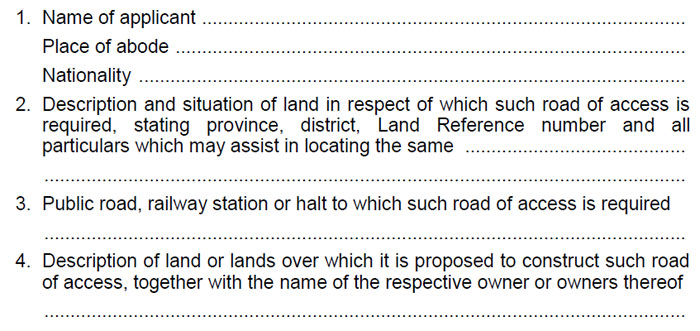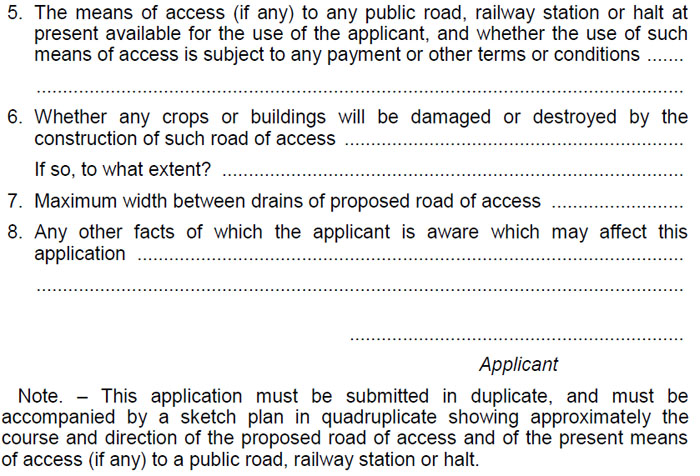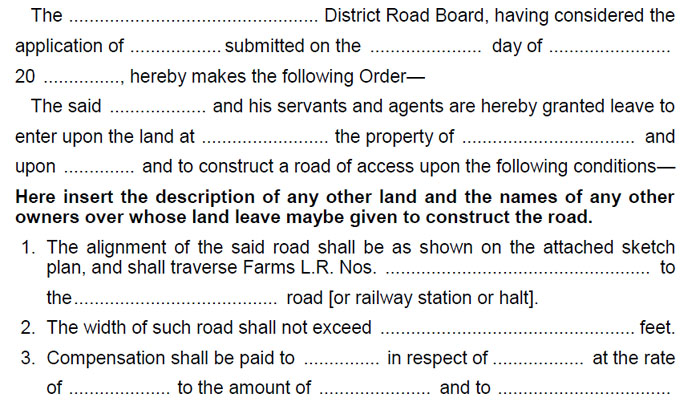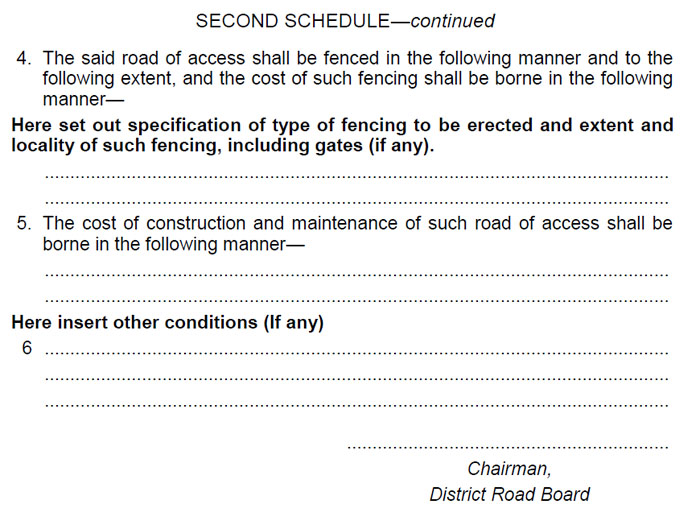|
|
| 1. |
Short title
This Act may be cited as the Public Roads and Roads of Access Act. [Act No. 3 of 1951.]
|
| 2. |
Interpretation
In this Act, except where the context otherwise requires—
“board” means a district road board appointed under section 3 of this Act;
“public road” means—
| (a) |
any road which the public had a right to use immediately before the commencement of this Act;
|
| (b) |
all proclaimed or reserved roads and thoroughfares being or existing on any land sold or leased or otherwise held under the East Africa Land Regulations, 1897, the Crown Lands Act , 1902, or the Government Lands Act (Cap. 280), at any time before the commencement of this Act;
|
| (c) |
all roads and thoroughfares hereafter reserved for public use;
|
“Registrar of Titles” means the appropriate registrar under any Act relating to the registration of title to land. [Act No. 3 of 1951, ss. 3 and 12, Act No. 19 of 1954, s. 2, Act No. 27 of 1959, Sch., Act No. 25 of 1963, Sch., L.N. 256/1963, L.N. 374/1964, L.N. 35/1970.]
|
| 3. |
Appointment of boards
| (1) |
The Minister may by order in the Gazette divide Kenya into districts for the purposes of this Act.
|
| (2) |
The Minister may appoint district road boards, consisting of not less than five members in any district, for the purpose of carrying out the provisions of this Act, and where in the opinion of the Minister such a course is practicable such members shall be elected in the prescribed manner.
|
| (3) |
The board shall elect one of such members to be chairman, and the names of all members appointed to boards shall be forthwith notified in the Gazette, and any number of the Gazette containing a notification shall be sufficient evidence thereof for all purposes.
|
| (4) |
A board may at any time appoint for a period not exceeding six months any person other than an existing member thereof to act in place of any member of the board who is absent from Kenya or incapacitated by illness or other temporary cause from discharging his duties as such member; and such acting member shall discharge the duties of the member who is so absent or incapacitated until the return to Kenya or removal of the incapacity of such member or the expiry of the period of appointment of such acting member, whichever first happens.
|
| (5) |
Except as provided in subsection (4) of this section, if any member without the consent of the chairman fails to attend three consecutive meetings of any board, he shall thereupon cease to be a member of such board.
|
| (6) |
Each member of a board shall, unless removed as provided in this Act, be entitled to hold office for the term for which he has been or is appointed, but such term shall not exceed two years; any member of a board may from time to time be reappointed for a further term not exceeding two years.
|
|
| 4. |
Meetings of boards
| (1) |
Boards shall meet at such times and places from time to time as necessity may require, or at such times and places as the Minister may direct.
|
| (2) |
Save as otherwise expressly provided in this Act, the powers, duties and authorities of boards may at any time be exercised by a quorum thereof consisting of not less than three members thereof, and during a vacancy in a board not exceeding three months the continuing members may (subject to there being a quorum) act as if there were no vacancy—
Provided that if any member of the board is personally interested in any matter before the board he shall not take any part in any proceedings relating to such matter, and the other members may co-opt such temporary member or members as may be necessary to form a quorum. [Act No. 3 of 1951, ss. 5 and 12.]
|
|
| 5. |
Chairman of board
| (1) |
At any meeting of a board, the chairman if present shall preside, and in his absence the board shall elect a chairman.
|
| (2) |
The chairman presiding at any meeting shall in the event of an equal division of votes at the meeting have a second or casting vote. [Act No. 3 of 1951, s. 12.]
|
|
| 6. |
Minutes
Boards shall cause correct minutes of all meetings to be kept, and a copy thereof shall be submitted forthwith to the Minister. [Act No. 3 of 1951, ss. 6 and 12.]
|
| 7. |
Employment of public officers
For the purposes of carrying out the powers, duties, authorities and obligations conferred or imposed upon boards by this or any other Act, boards, with the approval of the head of the department concerned, may make use of the services of any officers and employees of the public service. [Act No. 3 of 1951, s. 12.]
|
| 8. |
Dedication of line of public travel
| (1) |
Whenever it is made to appear to the Minister that requirements exist for the establishment, alteration or cancellation of a line of public travel or for the conversion of a road of access into a line of public travel, the Minister may, by order published in the Gazette, dedicate, alter or cancel such line of public travel or convert such road of access into a line of public travel.
|
| (2) |
In every order made under this section, the line of public travel to be established, altered or cancelled or the road of access to be converted into a line of public travel shall be clearly described.
|
| (3) |
Where an order under this section dedicates a line of public travel or converts a road of access into a line of public travel, such line of public travel shall be absolutely dedicated to the public as a public road within the meaning of any law now or hereafter in force relating to public roads.
|
| (4) |
Before making and publishing any order under this section dedicating a line of public travel or converting a road of access into a line of public travel, the Minister may, where there is a board, call upon such board to investigate and report upon the necessity for, or desirability of, any such line of public travel and to advise as to the best alignment of such a line of public travel. [Act No. 3 of 1951, s. 7.]
|
|
| 9. |
Application to construct road of access
| (1) |
Where any owner or occupier of land is in respect of his land so situated in relation to a public road which is passable to vehicular traffic, or to a railway station or halt, that he has not reasonable access to the same, he may make application to the board of the district in which such land is situate for leave to construct a road or roads (hereinafter called a road of access) over any lands lying between his land and such public road or railway station or halt, and every such application shall be made in duplicate in the form and contain the particulars required by the First Schedule to this Act:
Provided that, if the applicant is unable to make the sketch plan mentioned in the said Schedule without entering upon the lands over which he proposes that the road of access is to pass, he may apply to the board for leave to enter upon the said lands for the purpose of making the said sketch plan and the board may then make an order entitling the applicant to enter on the said lands.
|
| (2) |
Any owner or occupier of lands who has constructed a road in circumstances which did not require the making of an application under subsection (1) of this section may make application to the board of the district in which the road is situated for a declaration that the road is a road of access, and for the registration of the road of access as though an order had been made under section 11 of this Act.
|
| (3) |
Every such application shall be accompanied by such fees as the Minister may prescribe, and the board shall not be obliged to proceed upon any such application except upon payment of such fees. [Act No. 3 of 1951, s. 12, Act No. 19 of 1954, s. 3. L.N. 256/1963.]
|
|
| 10. |
Notice to be served on landowners affected
| (1) |
On the receipt of such application for leave to construct a road of access, the board shall serve a notice by personal service or by registered post to the last known address of the owner or occupier of land over which the proposed road of access is to pass, calling upon him to show cause within one month why the proposed road of access should not be granted.
|
| (2) |
Where a board has received more than one application for leave to construct a road of access, and the board is of opinion that any common question of law or fact will arise upon the consideration or hearing of such applications, it may order that such applications shall be joined; and where there is such joinder a decision or order may be made against or in favour of such one or more of such applicants as the board may think fit.
|
| (3) |
The board shall apply to the highway authority responsible for the public road to which any proposed road of access will be joined for consent to the proposed access to the public road, and the highway authority may refuse such consent if it considers that the proposed access would constitute a danger to traffic or that there is a reasonable alternative means of access, or may require access to the public road to be given at some different point or in some alternative manner. [Act No. 3 of 1951, ss. 8 and 12, L.N.256/1963.]
|
|
| 11. |
Granting of leave to construct road of access
| (1) |
The board shall then fix a day for the hearing of the application to construct a road of access, and after hearing the applicant or his representative and any other party who might be affected thereby may make an order in writing in the form in the Second Schedule to this Act, granting the applicant, his servants and his agents leave to enter upon the said land and construct such road of access and of such width as the district board may decide upon, subject to such conditions and to payment of such compensation in respect of any growing crops or permanent improvements damaged or destroyed by the construction of such road of access as to the board seems fit.
|
| (2) |
The board shall have power to determine by whom the costs of any application under this Act shall be borne, and to fix the amount thereof.
|
| (3) |
The board shall have power to direct that the costs of any person making objection to a proposed road of access shall be borne by such person if his objection is not allowed by the board.
|
|
| 12. |
Notification of order to be registered
| (1) |
Where a board makes an order under section 11 of this Act, it shall forthwith forward a notification of the making thereof in the prescribed form to the Registrar of Titles, together with the prescribed fees.
|
| (2) |
Upon receipt of any such notification, together with the prescribed fees, the Registrar of Titles shall cause such notification to be registered against the title or each of the titles to the land appearing to be affected by the order.
|
| (3) |
Every board shall maintain a register of all orders made by the board under section 11, and of all cancellations and alterations effected under section 14, of this Act; every such register shall contain a copy of all such orders, together with a copy of any plan referred to therein, and, where any such order is the subject of an appeal under section 16 of this Act, the board shall cause an appropriate entry of the result of the appeal to be made in the register.
|
| (4) |
The register may be inspected by any person upon payment of such fee as may be fixed by the board with the consent of the Minister, and any person inspecting the register shall be entitled to make copies of or extracts from the register, including any plan showing the alignment of the road of access.
|
| (5) |
Where the board, under section 14 of this Act, cancels or varies the alignment of any road of access, it shall forthwith forward a notification of such cancellation or variation in the prescribed form to the Registrar of Titles, who shall cause the same to be registered in manner provided by subsection (2) of this section.
|
| (6) |
Upon an appeal being determined under section 16 of this Act, the court making such determination shall cause a notification thereof to be forwarded to the Registrar of Titles, and thereupon the provisions of subsection (5) of this section shall apply to the registration of such notification as those provisions apply to the registration of a notification of the cancellation or variation of the alignment of a road of access.
|
| (7) |
The board may, by resolution, extend the foregoing provisions of this section to orders made before the 18th June, 1954, and where any such resolution is passed the said provisions shall apply to such orders as aforesaid accordingly:
Provided that no fees or other charges shall be payable to the board or to the Registrar of Titles in respect of such orders.
|
| (8) |
Where the board, in pursuance of section 9(2) of this Act, declares that a road is a road of access or grants an application under section 13(8) of this Act, it shall forthwith forward a notification thereof in such form as the Minister may prescribe to the Registrar of Titles, who shall cause it to be registered in manner provided by subsection (2) of this section. [Act No. 19 of 1954, ss. 4 and 5, L.N.256/1963.]
|
|
| 13. |
Right of way over road of access
| (1) |
When the said road of access has been granted and constructed, the applicant (which term for the purposes of this section includes his successor in title) shall have leave at all times to use the said road of access.
|
| (2) |
Save for the purposes of section 9 of this Act, the said road of access shall not be deemed to be a public road, but the applicant shall at his own cost erect, at the point where the road of access joins a public road, a notice board, of a design approved by the board, bearing the words “private road” legibly painted or inscribed thereon, and shall maintain the same efficiently to the satisfaction of the board.
|
| (3) |
Should the said road of access pass through an existing fenced enclosure, or an enclosure which at the time of granting the road of access was not fenced but which subsequently becomes fenced, the board in its discretion may require the applicant to provide, erect and maintain to its satisfaction a fence or fences of approved design, and shall apportion the cost of such fencing and its maintenance between the parties interested as it shall deem fit.
|
| (4) |
If the said road of access passes through any wall, fence or barrier existing at the date of application, the board may require the applicant to provide, erect and maintain to its satisfaction a gate of approved design where the road passes through the wall, fence or barrier.
|
| (5) |
The applicant shall at all times maintain the said road of access, and all works ancillary thereto, in a good and efficient state of repair to the satisfaction of the board, and, for the purpose of such maintenance, the applicant, his servants or his agents shall have leave to enter at all times upon the said road of access:
Provided that as little damage or inconvenience as possible shall be caused by such entry to the owner or occupier of the land over which the said road of access passes, and that such right of entry shall be subject to such conditions as the board may impose in granting the order for constructing the said road of access.
|
| (6) |
If the applicant fails or neglects to carry out the requirements of the board under subsections (2), (3), (4) and (5) of this section, the board may carry out the necessary work and recover the cost from the applicant in a court.
|
| (7) |
The owner or occupier of any land through which the road of access passes shall have the right to use the road of access at all times:
Provided that the board may at its sole discretion require such owner or occupier to pay to the applicant a proportionate share of the cost of the maintenance of the road.
|
| (8) |
If the owner or occupier of land, other than an owner or occupier through which the road of access passes, desires to use the road of access, he may apply to the board for authority to use it, and the board may grant such application on such terms and conditions as it may see fit, or may refuse the application.
|
| (9) |
An owner or occupier of land who makes an application under subsection (8) of this section shall serve a copy of his application by personal service or by post on the person to whom the road of access has been granted and on the owners or occupiers of the land through which the road of access passes. [Act No. 3 of 1951, s. 12, Act No. 51 of 1958, s. 23, L.N. 256/1963.]
|
|
| 14. |
Power to cancel or alter road of access
| (1) |
It shall be competent for a board for sufficient cause to order the cancellation or alteration of the alignment of a road of access, provided due notice has been previously given to any person who might be affected by such order.
|
| (2) |
The board shall have power to make an order for giving effect to any matter or thing over which the board has jurisdiction under this Act, or for the cancellation or alteration of any order previously made:
Provided that the provisions of this Act respecting the procedure to be followed and the notices to be given as respects an application to construct a road of access shall apply mutatis mutandis to the cancellation or alteration of any order previously made, and to any other order made under this Act.
|
|
| 15. |
Prohibition of classes of traffic
If it appears to the board that the prohibition of any particular class of traffic on a road of access is desirable in the interests of the persons entitled to use the road, the board may, by notice published in the prescribed manner, restrict the use of the road to a particular class or classes of traffic only.
|
| 16. |
Appeals
| (1) |
An appeal shall lie to a subordinate court of the first class by—
| (b) |
any person aggrieved by the making of, or the refusal to make, an order by a board under any of the provisions of this Act.
|
|
| (2) |
| (a) |
Such court shall summon to its assistance two competent assessors, but it shall not be bound to conform to the opinions of such assessors:
Provided that where the court does not conform to the opinions of the assessors it shall record its reasons for not conforming thereto.
|
| (b) |
Every assessor shall be summoned in such manner and shall receive such fees for his attendance as the court may direct.
|
|
| (3) |
Every such appeal shall be filed within thirty days of the date when the decision of the board was communicated in writing to the applicant or his representative and every other party affected by such decision.
|
| (4) |
| (a) |
against the making of an order, the respondent shall be the party upon whose application such order was made;
|
| (b) |
against the refusal to make an order, the respondent shall be any party who has opposed the making of such order:
Provided that where no party has opposed the making of such order the respondent shall be the board;
|
|
| (5) |
Upon the hearing of an appeal, the court shall have power—
| (a) |
to determine a matter finally;
|
| (b) |
to make any decision or order which the board had power to make;
|
| (c) |
to order the board to re-hear the matter;
|
| (d) |
to take additional evidence or to require such evidence to be taken.
|
|
| (6) |
| (a) |
The costs of every such appeal shall follow the event unless the court, for good reason, otherwise orders.
|
| (b) |
The court may, for good reason, order that the costs of any appeal shall be borne by the board, whether or not the board is the respondent in such appeal.
|
| (c) |
The amount of such costs shall be fixed by the court.
|
|
| (7) |
Upon any such appeal being filed, the minutes and any resolution of the board relating to the decision, order or refusal to make an order appealed against shall be supplied to the appellant free of charge, and shall form part of the record of the appeal. [Act No. 3 of 1951, s. 9, L.N.256/1963.]
|
|
| 17. |
Rules
The Minister may make rules governing the powers, rules, election, duties, obligations and conduct of business of boards prescribing anything which under this Act may be prescribed and generally for properly carrying out the provisions of this Act. [Act No. 3 of 1951, ss. 10 and 12.]
|
| 18. |
Penalties
Any person contravening any of the provisions of this Act, or refusing or wilfully failing to comply with the lawful order of a board, shall be guilty of an offence and liable to a fine not exceeding one thousand shillings or to imprisonment for a term not exceeding six months, or to both such fine and such imprisonment. [Act No. 3 of 1951, s. 12.]
|
| 19. |
Cognizance of offences
No court shall take cognizance of an offence of refusing or willfully failing to comply with the lawful order of a board except upon the complaint of any person who is damnified by such refusal or failure, or of the chairman of such board or of any person authorized by him for such purpose. [Act No. 3 of 1951, s. 11.]
|
FIRST SCHEDULE [section. 9, Act No. 3 of 1951, s. 13.]
APPLICATION FOR LEAVE TO CONSTRUCT A ROAD OF ACCESS
SECOND SCHEDULE [Section 11, Act No. 3 of 1951, s. 13.]
ORDER GRANTING LEAVE TO CONSTRUCT A ROAD OF ACCESS
|










